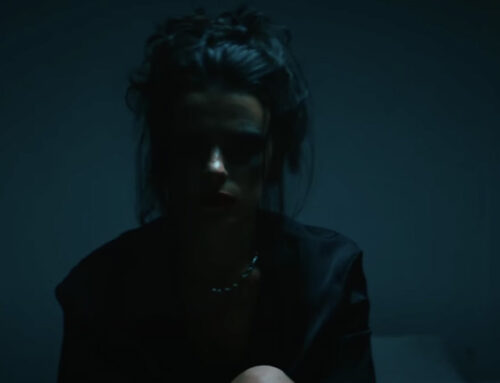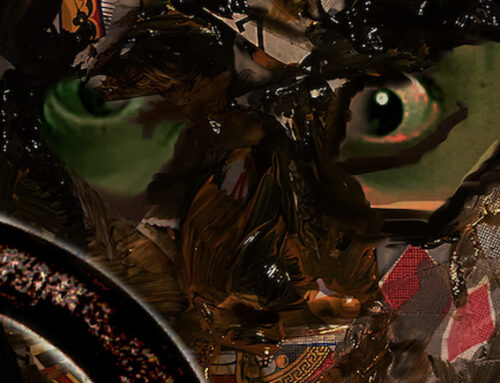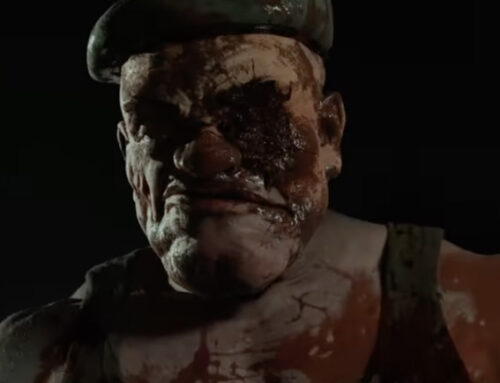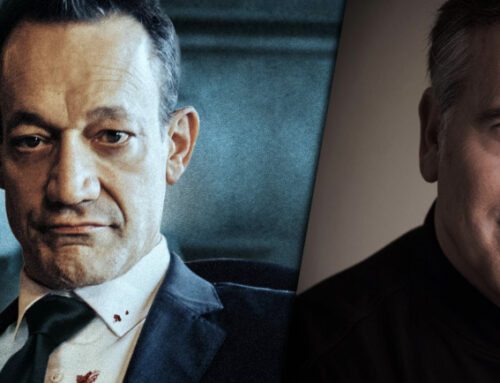One of the things that is nearly impossible for me to get past in a film is poorly written dialogue. I can find a way to excuse wildly unexpected plot twists, timeline and plot loopholes, and films breaking their own rules. The one thing I simply can’t understand is how a screenwriter could put dialogue on the page that simply no one would ever say. It’s almost as if they’ve never talked to another human. And yet, films like HEARTBEAT seem to thrive on the most trite, contrived, unnatural dialogue ever written.
I guess I should backtrack. HEARTBEAT centers around Jennifer (Nicole D’Angelo), an investigative journalist caught in the middle of a flurry of mysteriously connected murders. Young girls, all working for the same company called “Rigby”, are being brutally murdered. Jennifer has taken a boring day job as a reporter, is dealing with an obsessive ex, and wants nothing less than to be involved with another wild case like this. However, after multiple knocks at her door (literally) she can’t help herself.
What follows from here is a series of loosely intertwining stories and facts that don’t seem to make much sense or any sort of impact. Strangely race-fueled (let’s call a spade a spade – racist) portrayals of any non-white characters, huge glaring continuity errors, lavalier microphones visible on screen, actors fumbling over lines – all of these things are actually more compelling than the story that follows. There’s a meager attempt at a love story, some intrigue and espionage, and one of the least compelling killers I’ve ever seen (Each murder is shown to be via choking, but then all victims have blood coming from their mouths, and the killer is pulling a straight razor out of frame. I still don’t understand this.) I really wish I could spend my usual pair of paragraphs explaining this story to you, but without spoiling anything, there’s little more to say. This is how free and loose HEARTBEAT plays with plot.
HEARTBEAT seems to have been plagued with production issues – besides the previously mentioned continuity errors, there’s sound issues that are constantly distracting. Shifting light (both indoors and outdoors) gives away scheduling and reshoot issues. If the script was more substantial it would still be completely eclipsed by the lackluster production value. Instead, it just feels like HEARTBEAT is a movie that shouldn’t have been made under these circumstances. Too much wrong didn’t make a right. And, yes – the dialogue is excruciating, distracting, and another strike against HEARTBEAT.
A trigger warning, as I often have given in the past – HEARTBEAT includes depictions of sexual violence against women, coercion, assault, and abuse. These scenes do not have nearly enough lead up for the viewer to steel themselves, and do not fit in with the film in a way that one could prepare for them. This especially is why I offer a warning — normally, particularly in horror, trigger warnings are few and far between, because in a way you know what to expect. These scenes shocked me, and I was not prepared for them, in spite of their seemingly mild portrayal of this content.
It isn’t easy for me, HorrorBuzz’ resident cheerleader, to rail against a movie like I am now. If you’ve followed my reviews, you know that I find something redemptive in almost everything. HEARTBEAT took the wind out of my Pollyanna sails – and left me with more questions and concerns than answers. That being said, maybe HEARTBEAT is another film that represents 2020 – confusing, plagued (no pun intended) with issues, and frustratingly bad.
1/10 stars
| Heartbeat | ||
| RATING: | UR | Heartbeat Trailer |
| Runtime: | 72 Minutes | |
| Directed By: |
Nicole D’Angelo, Gregory Hatanaka, Chris Spinelli
|
|
| Written By: |
Gregory Hatanaka
|
|







